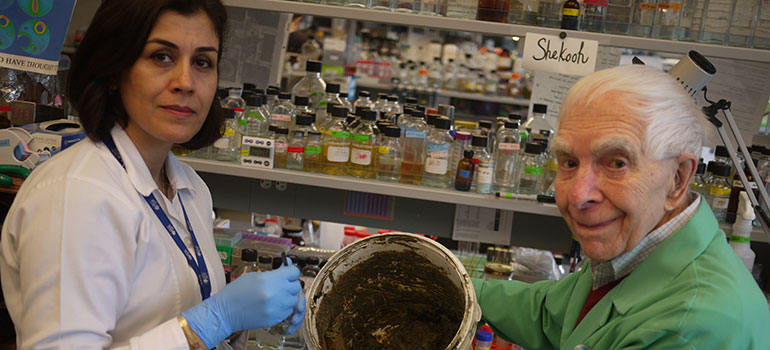Pseudomonas aeruginosa
See the following -
Antibiotic Resistance Doesn't Just Make Bacteria Harder To Kill – It Can Actually Make Them Stronger
 Bacteria can become drug-resistant in two ways – resistance can be natural, meaning that the genes conferring resistance are already present in the bacterial chromosome, or they can be acquired through mutation or by picking up antibiotic-resistance genes from other microbes. It is now possible to use new DNA-sequencing technologies to take a closer look at how the antibiotic resistance can make some bacteria weaker or stronger. And in a new study, we found that – contrary to conventional wisdom around antibiotics – resistance can actually make some bacteria fitter and even more virulent.
Bacteria can become drug-resistant in two ways – resistance can be natural, meaning that the genes conferring resistance are already present in the bacterial chromosome, or they can be acquired through mutation or by picking up antibiotic-resistance genes from other microbes. It is now possible to use new DNA-sequencing technologies to take a closer look at how the antibiotic resistance can make some bacteria weaker or stronger. And in a new study, we found that – contrary to conventional wisdom around antibiotics – resistance can actually make some bacteria fitter and even more virulent.
- Login to post comments
Antimicrobial Substances Identified in Komodo Dragon Blood
 In a land where survival is precarious, Komodo dragons thrive despite being exposed to scads of bacteria that would kill less hardy creatures. Now in a study published in the Journal of Proteome Research, scientists report that they have detected antimicrobial protein fragments in the lizard’s blood that appear to help them resist deadly infections. The discovery could lead to the development of new drugs capable of combating bacteria that have become resistant to antibiotics...
In a land where survival is precarious, Komodo dragons thrive despite being exposed to scads of bacteria that would kill less hardy creatures. Now in a study published in the Journal of Proteome Research, scientists report that they have detected antimicrobial protein fragments in the lizard’s blood that appear to help them resist deadly infections. The discovery could lead to the development of new drugs capable of combating bacteria that have become resistant to antibiotics...
- Login to post comments
As If the Killer Got Away
In a more than yearlong investigation, Reuters used court records, news reports, patient advocacy organizations and Web searches to identify individuals who had died of antibiotic-resistant infections and then contacted relatives to obtain death certificates and medical records. In some cases, the death certificate did not mention the lethal infection. In many others, it did, but the death occurred in a state that doesn’t track the infections. Even in states that do track some superbug deaths, none are counted nationally, in real time, in any unified surveillance system...
- Login to post comments
First Nations’ Ancient Medicinal Clay Shows Promise Against Today’s Worst Bacterial Infections
 Naturally occurring clay from Kisameet Bay, B.C. — long used by the Heiltsuk First Nation for its healing potential — exhibits potent antibacterial activity against multidrug-resistant pathogens, according to new research from the University of British Columbia. The researchers recommend the rare mineral clay be studied as a clinical treatment for serious infections caused by ESKAPE strains of bacteria...
Naturally occurring clay from Kisameet Bay, B.C. — long used by the Heiltsuk First Nation for its healing potential — exhibits potent antibacterial activity against multidrug-resistant pathogens, according to new research from the University of British Columbia. The researchers recommend the rare mineral clay be studied as a clinical treatment for serious infections caused by ESKAPE strains of bacteria...
- Login to post comments
Phage Therapy Shown to Kill Drug-Resistant Superbug
 Scientists from the University of Liverpool have shown that phage therapy could offer a safe and effective alternative to antibiotics in the treatment of Cystic Fibrosis lung infections. Chronic lung infections caused by the bacterium Pseudomonas aeruginosa are becoming increasingly difficult to treat due to antimicrobial resistance (AMR). With limited alternative therapeutic options available this has led to a renewed interest in (bacterio)phage therapy. Phages are viruses that kill bacteria but are otherwise harmless. A major advantage is that phages only target the harmful bacteria, so there are less side of the effects often associated with antibiotics...
Scientists from the University of Liverpool have shown that phage therapy could offer a safe and effective alternative to antibiotics in the treatment of Cystic Fibrosis lung infections. Chronic lung infections caused by the bacterium Pseudomonas aeruginosa are becoming increasingly difficult to treat due to antimicrobial resistance (AMR). With limited alternative therapeutic options available this has led to a renewed interest in (bacterio)phage therapy. Phages are viruses that kill bacteria but are otherwise harmless. A major advantage is that phages only target the harmful bacteria, so there are less side of the effects often associated with antibiotics...
- Login to post comments
Science, Society And Risk In The Anthropocene
The culture of too much hygiene in rapid, unplanned urbanising society with poor infrastructure exposes urban spaces to a particular risk brought about by unchecked use of technology. This article looks at the indiscriminate use of antibiotics and antibacterial consumer products, which form the aetiology for the emergence of new strains of antibiotic resistant bacteria (superbugs) in urban space, especially in waterbodies...
- Login to post comments
The Grim Propect of Antibiotic Resistance
 When people hear about antibiotic resistance creating “superbugs”, they tend to think of new diseases and pandemics spreading out of control. The real threat is less flamboyant, but still serious: existing problems getting worse, sometimes dramatically. Infections acquired in hospital are a prime example. They are already a problem, but with more antibiotic resistance they could become a much worse one. Elective surgery, such as hip replacements, now routine, would come to carry what might be seen as unacceptable risk. So might Caesarean sections. The risks of procedures which suppress the immune system, such as organ transplants and cancer chemotherapies, would increase...
When people hear about antibiotic resistance creating “superbugs”, they tend to think of new diseases and pandemics spreading out of control. The real threat is less flamboyant, but still serious: existing problems getting worse, sometimes dramatically. Infections acquired in hospital are a prime example. They are already a problem, but with more antibiotic resistance they could become a much worse one. Elective surgery, such as hip replacements, now routine, would come to carry what might be seen as unacceptable risk. So might Caesarean sections. The risks of procedures which suppress the immune system, such as organ transplants and cancer chemotherapies, would increase...
- Login to post comments
‘Superbug’ Scourge Spreads as U.S. Fails to Track Rising Human Toll
Fifteen years after the U.S. declared drug-resistant infections to be a grave threat, the crisis is only worsening, a Reuters investigation finds, as government agencies remain unwilling or unable to impose reporting requirements on a healthcare industry that often hides the problem...
- Login to post comments